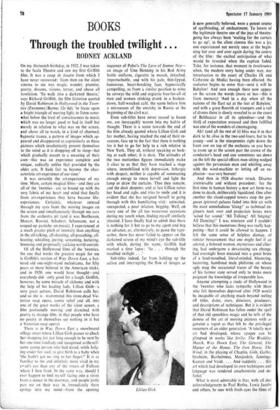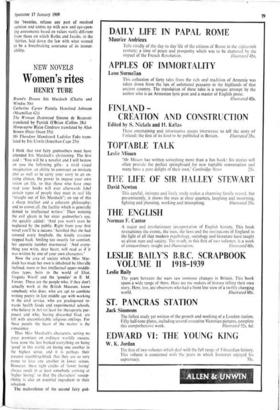Through the troubled twilight . . . BOOKS
RODNEY ACKLAND
On my thirteenth birthday, in 1922, I was taken to the Scala Theatre and saw my first Griffith film. It was a coup de foudre from which I have never recovered: from then on the silent cinema to me was magic, wonder, promise, poetry, dreams, visions, terror, and above all revelation. 'To walk into a darkened theatre,' says Richard Griffith, the film historian quoted by David Robinson in Hollywood in the Twen- ties (Zwemmer/Barnes 12s 6d), 'to focus upon a bright triangle of moving light, to listen some- what below the level of consciousness to music which was no longer good or bad in itself but merely in relation to what was on the screen, and above all to watch, in a kind of charmed, hypnotic trance, a pattern of images which ap- peared and disappeared as capriciously as those pictures which involuntarily present themselves to the mind as it is dropping off to sleep—but which gradually mount to a meaning of their own—this was an experience complete and unique, radically unlike that provided by the older arts. It bade fair to become the char- acteristic art-experience of our time.'
It was certainly the art-experience of my time. More, certain magical films—and they are all of the 'twenties—are so bound up with the very fabric of my heart and mind that finally from art-experiences they have become life- experiences. Certainly, whatever entered through my eyes from the moving images on the screen and simultaneously through my ears from the orchestra pit (and it was Beethoven, Mozart, Rossini, Schubert, Schumann, not a souped-up pastiche un-music), I experienced at a much greater pitch of intensity than anything in the all-talking, all-shouting, all-preaching, all- hooting, whistling, jeering, screaming, lecturing, booming and perpetually yakking world outside.
Of all the Hollywood films of the 'twenties, the one that works the greatest magic for me is Griffith's version of Way Down East, a bat- tered old one-night-stand melodrama, for fifty years or more beloved in the American sticks, and in 1920, one would have thought—and everybody did—only good for a laugh. Griffith, however, by some miracle of alchemy and with the help of his leading lady, Lillian Gish—a very great actress, David Robinson calls her, and so she is—transmuted this stone-dead Vic- torian soap opera, comic relief and all, into one of the great works of the silent screen, a film profoundly moving and drenched with poetry (a strange film, in that people who have no poetry in themselves see nothing in it but a Victorian soap opera).
There is in Way Down East a snowbound village street where Lillian Gish pauses to check her shopping list just long enough to be seen'by her one-time landlady and recognised as the self- same young person who had dared, while lodg- ing under her roof, to give birth to a baby when 'she hadn't got no ring to her finger!' It is as familiar to me and infinitely more vivid in my r.s.nd's eye than any of the streets of Fulham where I then lived. In the same way, should I ever happen to find myself facing into a room from a stance in the doorway, and people jostle past me on their way in, immediately there springs into my mind—from the opening
sequence of Pabst's The Love of Jeanne Ney- an image of Uno Henning in his Red Army battle uniform, cigarette in mouth, detached, imperturbable, and with his pale, thin-lipped, humorous, heart-breaking face, hypnotically compelling, as from a similar position to mine he surveys the wild and orgiastic free-for-all of men and women stinking drunk in a broken- down, half-wrecked cafe, the scene before him a microcosm of the anarchy in Russia at the beginning of the civil war.
Even sub-titles have never ceased to haunt me, are inescapably woven into my habits of thought. There is a scene towards the end of the film already quoted where Lillian Gish and her mother, having reached the end of their re- sources, face up to the fact that there is nothing for it but to go for help to a rich relative in New York. They sit, without speaking or look- ing at each other; it is dusk. The attitudes of the two motionless figures immediately make it clear to us that they have reached a stage where, immobilised with depression, lethargic with despair, neither is capable of summoning enough energy to rouse herself and light the lamp or draw the curtains. Thus they remain; and the dusk deepens; and at last Lillian raises her head and sighs and tries to smile and it is evident that she has resigned herself to going through with this humiliating visit: uninvited, unexpected, a poor relation, begging. Well, on every one of the all too numerous occasions during my youth when, finding myself similarly situated, I have finally had to admit that there is nothing for it but to go to my agent and beg an advance, or, alternatively, to pawn the type- writer, there has never failed to appear on the darkened screen of my mind's eye the sub-title with which, during the scene, Griffith had marked a time lapse: `So . . . through the troubled twilight . .
Sub-titles indeed, far from holding up the action and interrupting the flow of images as Lillian Gish is now generally believed, were a potent source of spellbinding, of enchantment. To lovers of the legitimate theatre one of the joys of theatre- going has always been 'waiting for the curtain to go up'; in the silent cinema this was a joy one experienced not merely once at the begin- ning but over and over again during the course of the film: the excited anticipation of what would be revealed when the caption faded. Take, for instance, that moment in Intolerance when, the modern story being under way, our introduction to the court of Charles IX and Catherine de Medici having been effected, the audience begins to sense that—next it will be Babylon! And sure enough there now appear on the screen the words (more or less—this is from memory) 'And in a day when all the nations of the East sat at the feet of Babylon,' and with a great flourish of trumpets and a roll of drums there is slowly revealed to us the court of Belshazzar in all its splendour—and the thrill of expectation aroused and then fulfilled was one of the wonders of cinemagoing.
Ah! (and all the rest of it) bliss was it in that dark to be alive in the two-and-fours, but to be young—and in the ninepennies right down the front row on top of the orchestra so you have to crane up at the screen past the crown of the conductor's head and can sometimes see down on the left the special-effects man sitting wedged against the percussion man and whirling away with the wind-machine or letting off an ex- plosion—was very heaven!
And then in 1928 disaster struck. Disaster irretrievable and without precedent: for the first time in human history a new art form was done to death, deliberately liquidated. One after another the cloud-capped towers atop the gor- geous (picture) palaces faded into thin air with the most unmelodious Ilang!' as technical en- gineers took over and projection boxes were 'wired for sound.' All Talking! All Singing! All Dancing!' I was nineteen and I couldn't believe that this monstrous thing was really hap- pening—that it could be allowed to happen. I felt the same sense of helpless dismay, of sinister bereavement that one might feel if an adored, a beloved woman, mysterious and allur- ing, had undergone a devastating sex change, had overnight been mutated into a great brute of a loud-mouthed, literal-minded, blustering, hectoring, hamfisted male philistine on whose ugly mug the occasional traces of the beauty of his former state served only to make more poignant the knowledge of irreparable loss.
Anyone attempting a study of Hollywood in the 'twenties who lacks sympathy with those who felt themselves deprived after 1928 would be incapable of anything much beyond reeling off titles, dates, stars, directors, producers, and descriptions of techniques. But it is evident that David Robinson has fallen under the spell of that old speechless magic and he tells of the demise of the art of moving pictures with as genuine a regret as that felt by the privileged mourners of an older generation. 'A totally new art had developed, whose apogee can be glimpsed in works like Strike, The Wedding March, Way Down East, The General, The Master of the House, The Iron Horse, The Wind; in the playing of Chaplin, Gish, Garbo, Stroheim, Barthelmess, Mosjoukin, Jannings, Keaton and Veidt. . . . And suddenly . . . this art which had developed its own techniques and language was rendered anachronistic and de- funct.'
What is most admirable is that, with all due acknowledgement to Paul Rotha, Lewis Jacobs and others, he sees with fresh eyes the films of the 'twenties, refuses any part of received opinion and comes up with new and eye-open- ing assessments based on values vastly different from those on which Rotha and Jacobs, in the 'thirties, laid down the law with what seemed to be a breathtaking assurance of its immut- ability.



































 Previous page
Previous page